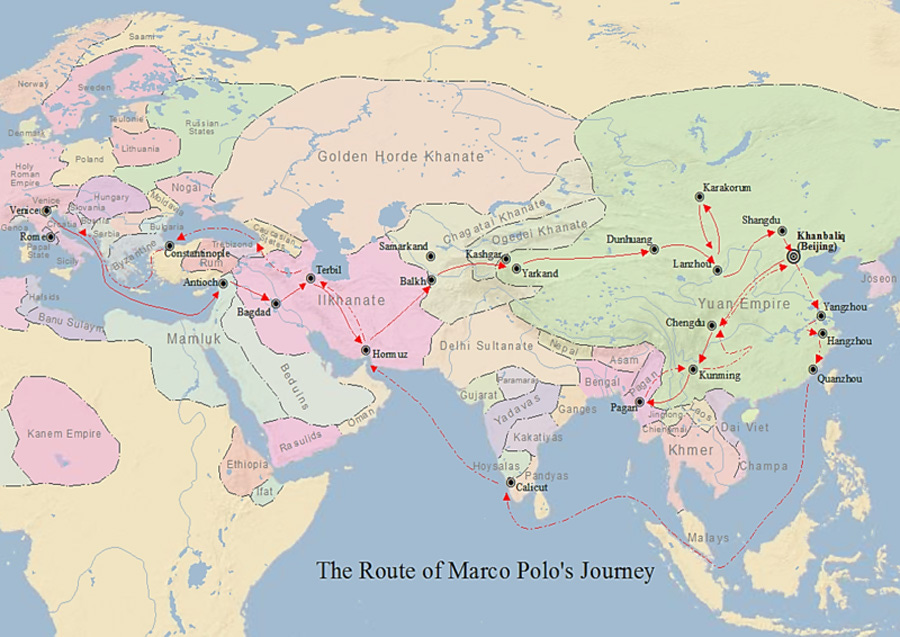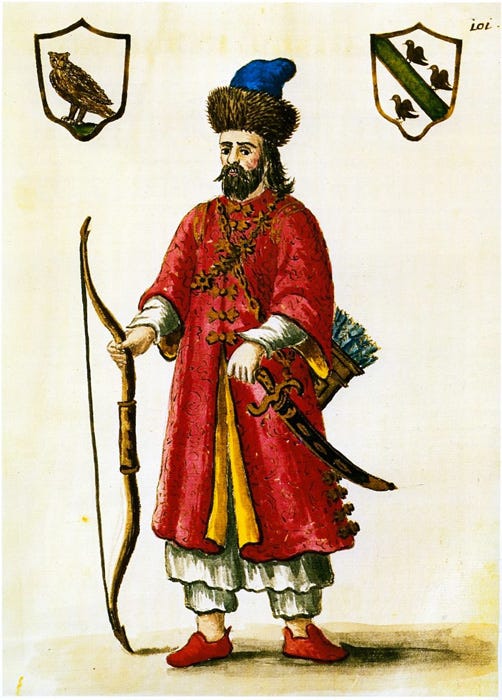Marco Polo and His Adventures: Fact or Fiction?
Was Marco Polo, the famous Venetian adventurer, really best buds with Kublai Khan?
While everyone has heard of the name Marco Polo at one time or another, most people really don’t know what he did to earn his fame.
In fact, this individual is known as one of the great adventurers in history. In his time and for centuries afterward, Marco Polo was renowned across the globe for being a merchant, traveler, and an expert on the Mongols. He traveled extensively from his home in Venice, Italy, down the legendary Silk Road and throughout the Mongolian empire. There, he found himself in the employ of Kublai Khan, grandson of the famous Genghis Khan, the founder and first ruler of the Mongol Empire (Kublai a pretty scary character in is own right).
Marco’s book “The Travels of Marco Polo” was recorded between 1298-99, while Marco was in prison with writer Rustichello da Pisa. The book was written in Franco-Italian and then translated into many other languages over the course of the 14th century.
The travels as recorded in this book had a profound impact on Western Europe and later explorers. Christopher Columbus, for example, is said to have owned a well-worn copy of Marco Polo’s travel writings.
How did a simple merchant end up as a member of the Mongol court? This is the story, or potentially the tall tale, of the merchant from Venice: Marco Polo.
Family Beginnings
Marco Polo was born in 1254 in Venice. His father Niccolò Polo was based there, but spent much of his time traveling to Asia with his brother Maffeo. They were successful jewel merchants whose journeys into the continent to the East had already brought them into contact with Kublai Khan and the Mongols.

As father and son, the Polo family had spent little time together until Marco’s mother died when Marco was just 5. He had to wait a further 10 years to meet his father, who brought him on his next voyage so the two could finally get to know each other better.
The Silk Road and Kublai Khan
Marco, Niccolò, and Maffeo set sail across the Mediterranean Sea, before traveling overland across Armenia, Persia, Afghanistan, and the Pamir Mountains (in modern day Tajikistan). From there, they tackled the formidable Gobi Desert and the route into China, where they met the famous (or infamous, depending on one’s perspective) Kublai Khan.
By the time they were granted an audience with the Khan, their journey had taken approximately four years to complete. One contributing factor to this was a year’s rest in the Afghanistan mountains, in which Marco was beset with illness. It was perhaps malaria; however, he claimed that he recovered fully, aided by the climate.
Kublai Khan welcomed the merchants into his marble and gold summer palace at Xanadu. Marco described the magnificent palace as a place of opulence and exquisite art. It featured painted marble with figures of men, beasts, birds, and flowers.
Kublai Khan invited the trio to attached themselves to his court and to immerse themselves in Chinese culture and the language. Marco was appointed as a special envoy, granting him the ability to travel throughout Asia. He distinguished himself so much that he was given the governing title of a Chinese city and earned a seat on the council of the emperor.
In all, the merchants spent more than 17 years in Mongol China. The Polos had become extremely rich and of such high status, that they were entrusted to escort a Mongolian princess, Cogatin, to meet a Persian prince.

Unfortunately, on the trip, many of the crew died and upon reaching Persia, they found the bride’s husband-to-be was also dead. To make matters worse, in their absence Kublai Khan had also passed away. The Polos were thus left vulnerable to local rulers whom they were forced to pay off to ensure their safety.
Recognizing the changing political climate, they set out for home. Managing to avoid too much more trouble, they arrived back in Venice in one piece.
War And Imprisonment
Back in Venice after nearly a two-decade absence, the Polos arrived in a place they did not recognize. Venice was at war with its longstanding rival Genoa, and soon the Polos were once more thrust into the action.
Marco, utilizing his newfound, albeit slightly diminished, wealth, built his own warship, as was the custom in Venice, and began to take part in the war effort. His military career however was short-lived, and he was quickly captured and imprisoned in Genoa.
Marco found himself behind bars for approximately two years, sharing a room with the author and poet Rustichello. It was during this time that Marco told his cellmate of his travels and the wondrous things that he had seen and done. Rustichello dutifully recorded the stories, and they were released in 1299 when the war ended.
Marco Polo settled down after prison and had a family, all the while attempting to revive his business. Rustichello on the other hand went on to publish the writings that would make Polo famous, in French and recorded painstakingly by hand as the printing press had not yet been invented. Today there are still 130 surviving copies of this original text, in various languages and each with its own unique details.




